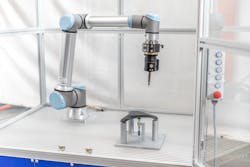FlexTrim In some applications, such as for the automotive sector, there are large injection-molded plastic parts that require deburring. Frimo, in close cooperation with Schunk GmbH & Co. KG, Lauffen, Germany, has developed a robotic cell for automating deburring tasks. The cell encloses a T-slot table that includes a Universal Robots cobot, which can be equipped with a deburring spindle powered by compressed air.
What’s new? The FlexTrim robotic deburring cell, which Frimo displayed at K 2022.
Benefits Maximized flexibility. Rather than requiring a deburring solution to be tailored to a single application, operators can train the cobot to work with different parts with simple manual guidance. Parts of very different sizes can be accommodated: Either the cobot can guide its deburring spindle along the part, or the cobot can hold the part and move it along a fixed deburring spindle. The cell also can be equipped with a stationary belt grinder, driven wire brushes, or grinding and polishing devices. Depending on the tools used, the cell also can process components made of aluminum or steel.
Frimo Inc., Wixom, Mich., 248-668-3160, www.frimo.com
About the Author
David Tillett
Associate Editor David Tillett writes and edits for Plastics Machinery & Manufacturing, Plastics Recycling and The Journal of Blow Molding. He covers new products, industry news, patents and consumer and business equipment. He has more than 20 years of experience in daily newspaper, online and magazine journalism.
